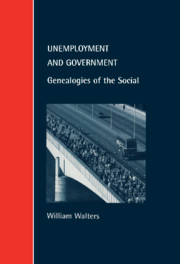Book contents
- Frontmatter
- Contents
- Acknowledgements
- Introduction
- 1 The Discovery of Unemployment
- 2 Inventing Unemployment: The Birth of the Labour Exchange
- 3 Governing Unemployment as a ‘Risk’
- 4 Governing Through the Long-Term Unemployed: Unemployment Between the Wars
- 5 Unemployment and its Spaces
- 6 Governing Divided Societies: The New Deal
- Conclusion
- Notes
- Index
2 - Inventing Unemployment: The Birth of the Labour Exchange
Published online by Cambridge University Press: 07 September 2010
- Frontmatter
- Contents
- Acknowledgements
- Introduction
- 1 The Discovery of Unemployment
- 2 Inventing Unemployment: The Birth of the Labour Exchange
- 3 Governing Unemployment as a ‘Risk’
- 4 Governing Through the Long-Term Unemployed: Unemployment Between the Wars
- 5 Unemployment and its Spaces
- 6 Governing Divided Societies: The New Deal
- Conclusion
- Notes
- Index
Summary
The last chapter examined the discovery of unemployment, tracing its formation as a conceptual object. This chapter deals with roughly the same time period, but begins to trace the construction of unemployment as an object of regulation. It does this in two stages. First, through a consideration of some of the most significant political programmes which, in competition with one another, sought to define the terms of a modern policy for unemployment. These programmes help to demarcate the field of possible ways of acting on unemployment. The relation between this field and the famous Liberal social legislation of the 1908–14 period is discussed. Second, as a way of demonstrating the strengths of a governmentality approach to social policy questions, a seemingly mundane administrative device is analysed: the labour exchange. Its significance lies not just with the fact that it brings a new regime of routine and comprehensive visibility to unemployment and the labour market. The labour exchange is also interesting as a prism through which to view new relationships of citizenship, power, and knowledge which take shape at the start of this century. These relations will be key features of welfare state governance.
THREE PROGRAMMES FOR GOVERNING UNEMPLOYMENT
I have explained how unemployment becomes an object of theoretical controversy. It is of course at the same time a site of political argumentation. Since political discourse is a powerful factor in establishing the horizon for what is thinkable in terms of policies, here I want to survey the main political programmes addressing unemployment at the turn of the century.
- Type
- Chapter
- Information
- Unemployment and GovernmentGenealogies of the Social, pp. 36 - 52Publisher: Cambridge University PressPrint publication year: 2000



